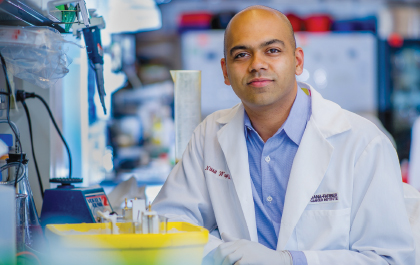When it comes to cancer, one of the most frustrating moments for patients and doctors alike is discovering a promising treatment has suddenly stopped working. Generally, this occurs when cancer develops resistance and finds ways to bypass a treatment’s effects. Cancer drug resistance happens more often than anyone would like and poses a considerable problem in cancer research today. Luckily, there are bright young researchers eager to step up to the challenge—researchers like Nikhil
Wagle, MD, Assistant Professor of Medicine at Harvard Medical School, Associate Member at the Broad Institute of Massachusetts Institute of Technology and Harvard, and Medical Oncologist at Dana-Farber Cancer Institute.
In 2012, Dr. Wagle received a Conquer Cancer Foundation of ASCO Young Investigator Award to study resistance in melanoma. Specifically, he and his team explored why people with BRAF-mutant melanoma stopped responding to drugs that initially helped treat their disease. The study was a success, and they were able to identify why resistance emerged. “Many of the tumor cells became resistant because they developed additional mutations in the pathway that these drugs were targeting,” explained Dr. Wagle. “Basically, the tumors figured out how to outsmart the treatment by developing mutations to circumvent the drugs.”
The implications of Dr. Wagle’s study are great: “Now that we understand why this resistance emerges and the mechanisms of resistance that occur, we can think about the right treatment combinations either to prevent or overcome resistance and keep patients responding to treatment,” he said.
In fact, a number of clinical trials building on his study’s findings are already in progress. These studies are testing novel combinations of drugs or newer drugs to improve outcomes for patients with metastatic melanoma. If the trials yield promising results, they could mean increased survival rates.
“In my career, there have been really great triumphs I’ve shared with patients and really difficult moments I’ve shared with patients and their families,” noted Dr. Wagle. “The combination of the two highlights what’s possible, but also where we need to go. The promise of what we can do is huge.”
In order to realize this promise and continue making progress against cancer, however, a great deal of resources will be necessary. As federal funding for cancer research remains low, investigators must turn to philanthropic organizations like the Conquer Cancer Foundation for support.
“Funding for cancer research is such an important issue and can really make or break what we are able to do,” said Dr. Wagle. “I’m incredibly grateful for Conquer Cancer Foundation donors who have enabled people like me to do research in ways that otherwise might not have been possible.” ■
© 2016. American Society of Clinical Oncology. All rights reserved.


